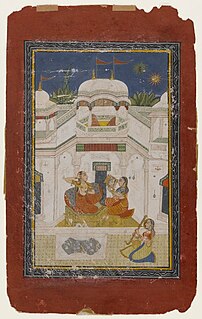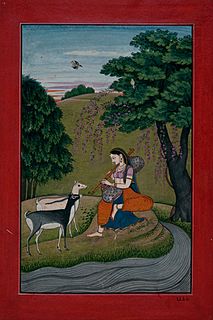Related Research Articles
A Thaat is a "Parent scale" in North Indian or Hindustani music. The concept of the thaat is not exactly equivalent to the western musical scale because the primary function of a thaat is not as a tool for music composition, but rather as a basis for classification of ragas. There is not necessarily strict compliance between a raga and its parent thaat; a raga said to 'belong' to a certain thaat need not allow all the notes of the thaat, and might allow other notes. Thaats are generally accepted to be heptatonic by definition.

Bilaval or Bilawal is a raga and the basis for the eponymous thaat in Hindustani classical music. Raga Bilaval is named after Veraval, Gujarat.

Bhairav is an Indian classical raga of Bhairav thaat. It is a sampurna raga that is traditionally performed in the morning and also as the beginning piece in concerts. It is the defining raga of its own Thaat.
Raga Malgunji is a Hindustani classical raga from the Khamaj Thaat. Some say it is a part of the Kafi Thaat too.

Bhairavi is a Hindustani Classical heptatonic (Sampurna) raga of Bhairavi thaat. In Western musical terms, raga Bhairavi employs the notes of the Phrygian mode, one of the traditional European church modes.
Bhoopali, also known as Bhoop, Bhopali, or Bhupali, is a Hindustani classical raga. Bhupālī, is a raag in Kalyan Thaat. It is a pentatonic scale. Most of the songs in this raga are based on Bhakti rasa. Since it uses 5 notes, belongs to the "Audav jaati" of ragas.
Ahir Bhairav is a Hindustani classical raga. It is a mixture of Bhairav and the ancient, rare raga Ahiri or Abhiri, or perhaps a mixture of Bhairav and Kafi.
Alhaiya Bilaval is a Hindustani classical raga. It is the most commonly performed raga of a large group of ragas that are mainly based on a scale more or less identical to the Western major scale. For this reason, that scale itself is known as the Bilaval Thaat. It is often simply referred to as Bilaval, although in the 17th century Alhaiya and Bilaval may have been separate ragas. Alhaiya Bilaval is a raga in which M is the main key.
Bahar is a Hindustani classical raga. This raga is very similar to raga Malhar. This raga is from the Kafi Thaat.
Raga Bihag is a Hindustani classical raga belonging to the Bilaval Thaat. It is a melodious Raaga for beginners as well as experts. Raga Bihag uses all seven music swars. In Bihag, both the Madhyams are used. The Shuddha Madhyam is the prominent one while Teevra Madhyama is only used with Panchama in Phrase PA MA' GA MA GA. In Avaroha, Rishabh and Dhaivat are not used as resting notes however they are used in Meend. In this Raag, Nishad is a prominent note and Aalaps or Taans are generally started from this note.
Brindavani Sarang or Brindabani Sarang, also known as raga Sarang, is a Hindustani classical raga. It is also called Vridavani Sarang. This raga falls under the category of Sarang ragas.
Kafi is a raga in Hindustani classical music. It corresponds to Kharaharapriya in Carnatic music.

Miyan ki Todi, often simply referred to as Todi or Darbari Todi, is a Hindustani classical raga which gave its name to the Todi thaat, one of the ten types of classical music according to the musicologist Bhatkhande. Ragas from the Todi raganga include Todi itself, Bilaskhani Todi, Gujari Todi, Desi Todi, Hussaini Todi, Asavari Todi, and Bahaduri Todi.
Tilak Kamod is a Hindustani classical raga.
Jogiya, or Jogia, is a raga in Hindustani classical music. It is based on Bhairav Thaat. It is played at the 1st Prahar of the day, dawn time. The name Jogiya came from Jogi, a corruption of yogi.
Nat Bhairav is a Hindustani classical heptatonic (Sampurna) raga of Bhairav Thaat. Traditionally it is a morning raga. It is one of the most important ragas of the Bhairav anga.
Marva or Marwa is one of the ten basic thaats of Hindustani music from the Indian subcontinent. It is also the name of a raga within this thaat.

Rishabh is the second svara from the seven pronouncing while singing the syllable, Rishabh is pronounced as Re and Ri. It is also called as ऋषभ in the Devanagri script.

Dhaivat is the sixth svara from the seven svaras of Hindustani music and Carnatic music. Dhaivat is the long form of the syllable ध. For simplicity in pronouncing while singing the syllable, Dhaivat is pronounced as Dha. It is also called as धैवत in the Devanagri script.
References
- ↑ Chib, S.K.S.; Khan, A.A. (2004). Companion to North Indian Classical Music. Munshiram Manoharlal Publishers. p. 39. ISBN 978-81-215-1090-5 . Retrieved 27 May 2021.
- Bor, Joep (ed). Rao, Suvarnalata; der Meer, Wim van; Harvey, Jane (co-authors)The Raga Guide: A Survey of 74 Hindustani Ragas. Zenith Media, London: 1999.